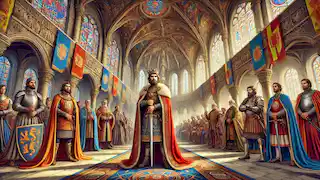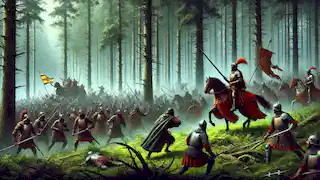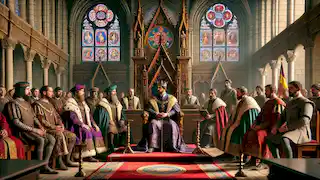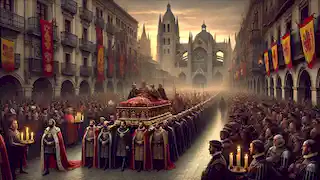The Wise King of Leon
Reading Time: 13 min

About Story: The Wise King of Leon is a Legend from spain set in the Medieval. This Dramatic tale explores themes of Wisdom and is suitable for All Ages. It offers Inspirational insights. The legacy of a wise king who brought justice, peace, and enlightenment to his kingdom.
In the heart of medieval Spain, during a time when kingdoms clashed and alliances were fragile, there existed a ruler whose wisdom and courage were renowned far and wide. He was known as Alfonso III, the Wise King of León. His reign marked a golden era for the Kingdom of León, a time when justice, compassion, and intellect guided the land through turmoil and triumph alike. This is the story of how King Alfonso's wisdom not only brought prosperity to his people but also forged a legacy that would be remembered for centuries. King Alfonso III ascended to the throne at a young age, inheriting a kingdom that was torn by internal strife and external threats. His father, Ordoño I, had left behind a strong but divided realm, where noble families vied for power, and neighboring kingdoms looked to encroach upon León’s borders. However, Alfonso was no ordinary monarch; he possessed a keen intellect and a deep sense of justice, qualities that soon set him apart from his predecessors. Upon taking the throne, Alfonso surrounded himself with the wisest and most loyal advisors in the kingdom. His court was a place where scholars, philosophers, and warriors alike could voice their opinions, knowing that their king valued knowledge above all else. He often held long discussions with his advisors, considering every possible angle before making decisions. This habit of consulting others, rather than acting impulsively, earned him the respect of both his subjects and his enemies. One of his closest advisors was a man named Rodrigo, a seasoned warrior with a sharp mind. Rodrigo had served Alfonso's father and was known for his strategic brilliance in battle. But more than a warrior, Rodrigo was a man of great wisdom, often counseling the king to consider the broader implications of his actions. The bond between Alfonso and Rodrigo grew stronger with each passing year, and together, they faced the challenges that threatened the kingdom. The most significant threat to King Alfonso's reign came from the south, where the powerful Moors had established a foothold in the Iberian Peninsula. Their armies were formidable, their leaders cunning, and their ambitions boundless. The Christian kingdoms of the north, including León, lived in constant fear of Moorish invasions. One day, news arrived at the court that a massive Moorish army was marching toward León. The kingdom's borders had been breached, and the invaders were advancing with terrifying speed. Panic spread through the court, and many advisors urged the king to retreat to the mountains, where they could hold out against the invaders in the fortified strongholds. But Alfonso would not hear of it. “A king does not abandon his people,” he declared, his voice calm but resolute. “We will face this threat head-on, with courage and wisdom. If León is to stand, it will stand united, and it will stand strong.” Rodrigo, who had remained silent until now, stepped forward. “Your Majesty,” he said, “I believe that we can outmaneuver the Moors if we use the land to our advantage. The plains are their strength, but the mountains and forests are ours. Let us lure them into terrain where their numbers will count for less, and our knowledge of the land will give us the upper hand.” The king nodded thoughtfully. “You speak wisely, Rodrigo. Prepare the men. We will meet the Moors in the forests of Covadonga.” The Battle of Covadonga was one of the most significant events in the history of the Kingdom of León. The Moorish army, confident in their superior numbers, followed King Alfonso's forces into the dense forests, where their cavalry and heavy infantry found it difficult to maneuver. The terrain, which the Moors had believed to be a mere obstacle, became a deadly trap. King Alfonso and Rodrigo had devised a plan that would turn the tide of the battle. Small groups of Leónese soldiers, hidden in the trees and underbrush, would ambush the Moorish forces at key points, creating confusion and disrupting their formations. Meanwhile, the main body of the Leónese army, led by Rodrigo, would attack from higher ground, forcing the Moors into a defensive position. As the battle raged on, it became clear that the Moors were losing their advantage. Their cavalry was bogged down in the thick undergrowth, their archers unable to find clear targets. The Leónese soldiers, familiar with the terrain, moved with agility and precision, striking swiftly and retreating before the Moors could respond. King Alfonso himself fought alongside his men, inspiring them with his courage and determination. He wielded his sword with skill, but it was his presence on the battlefield that truly galvanized the troops. Seeing their king in the thick of battle, unafraid and resolute, filled the soldiers with a sense of invincibility. They fought not just for victory, but for their king and their homeland. The turning point came when Rodrigo, leading a daring charge down the hillside, broke through the Moorish lines, causing their army to splinter. Panic set in among the invaders, and their retreat quickly turned into a rout. The Moors fled the battlefield, leaving behind their dead and wounded, along with a shattered sense of invincibility. The victory at Covadonga was more than just a military triumph; it was a symbolic moment for the Christian kingdoms of the north. It proved that the Moors were not invincible and that the Kingdom of León, under the wise and courageous leadership of King Alfonso, could stand against any threat. With the threat of the Moors temporarily subdued, King Alfonso turned his attention to the internal affairs of his kingdom. He knew that a ruler's duty was not only to defend the realm but also to ensure that justice and fairness prevailed within it. One of the most pressing issues in León was the land disputes between noble families. These disputes often led to blood feuds, which not only weakened the kingdom but also caused great suffering among the common people. Alfonso understood that peace within the kingdom was as crucial as peace with its neighbors. To address this, the king established a system of courts where disputes could be resolved fairly and without violence. He appointed judges known for their integrity and wisdom, and he himself would often preside over cases that were particularly complex or contentious. His judgments were always guided by a deep sense of justice, tempered with compassion for those who had been wronged. One such case involved two noble families, the House of Vargas and the House of Mendoza, who had been at odds for generations over a tract of fertile land. Both families claimed ownership, and the dispute had escalated to the point of armed skirmishes. King Alfonso summoned the heads of both families to his court and listened carefully to their arguments. After days of deliberation, he pronounced his judgment: the land would be divided equally between the two families, but with a condition. They would have to work together to cultivate it, sharing the labor and the harvest. At first, both families were outraged by the decision. But the king remained firm, explaining that cooperation would not only benefit them but also serve as an example to the rest of the kingdom. Reluctantly, the Vargas and Mendoza families agreed to the arrangement. Over time, their cooperation turned into friendship, and the once-bitter enemies became allies. The land flourished under their joint care, and the story of their reconciliation became legendary throughout León. It was a testament to the wisdom of their king, who had turned a potential source of division into one of unity and prosperity. King Alfonso’s reign was also marked by a deep commitment to learning and culture. He believed that knowledge was the key to a prosperous and just society, and he encouraged the growth of education throughout the kingdom. Under his patronage, León became a center of learning, attracting scholars, poets, and artists from all over the Iberian Peninsula and beyond. The king himself was a learned man, fluent in several languages and well-versed in philosophy, history, and science. He often engaged in debates with scholars at his court, challenging their ideas and encouraging them to push the boundaries of knowledge. His love of learning earned him the nickname "Alfonso the Wise," and his court became known as one of the most enlightened in Europe. One of King Alfonso's most ambitious projects was the creation of a vast library in the capital city of León. This library, which came to be known as the Royal Library of León, housed thousands of manuscripts, many of which were rare and precious works of literature, science, and philosophy. Alfonso personally oversaw the collection of these manuscripts, sending emissaries to far-off lands to acquire books and scrolls that would enrich the library's holdings. But the king's commitment to education extended beyond the walls of his palace. He established schools in towns and villages across the kingdom, ensuring that even the children of commoners had access to learning. He believed that an educated populace would strengthen the kingdom, creating citizens who were not only skilled in their trades but also capable of understanding and contributing to the governance of their land. King Alfonso's dedication to learning had a profound impact on León. The kingdom became known as a beacon of culture and enlightenment, attracting scholars from as far away as the Byzantine Empire and the Islamic world. The knowledge and ideas that flowed into León during this time helped to shape the kingdom's future, laying the groundwork for advancements in various fields, from medicine to astronomy. As King Alfonso grew older, he began to think more and more about the legacy he would leave behind. He knew that his time on the throne would not last forever, and he wanted to ensure that the kingdom would continue to prosper after his death. One of the greatest challenges facing León was the threat of renewed conflict with the Moors. Although the victory at Covadonga had been a significant blow to the invaders, Alfonso understood that peace was fragile and that it needed to be actively maintained. To this end, the king sought to establish diplomatic relations with neighboring Muslim rulers. He believed that dialogue and negotiation could achieve what swords could not – a lasting peace between the Christian and Muslim realms of Spain. Through a series of carefully crafted treaties, Alfonso succeeded in creating a network of alliances that ensured the security of his kingdom while also promoting trade and cultural exchange. These treaties were not without their critics. Many in León saw them as a sign of weakness, arguing that the Moors could not be trusted and that only military strength could keep the kingdom safe. But Alfonso held firm in his belief that peace was the best path forward. He pointed to the prosperity that had flourished during times of peace, compared to the destruction and suffering brought by war. In the final years of his reign, King Alfonso devoted himself to ensuring that this peace would endure. He continued to strengthen the kingdom's defenses, building new fortifications and training the army in case of future threats. But he also invested heavily in diplomacy, sending envoys to distant courts and welcoming foreign dignitaries to León. King Alfonso’s efforts bore fruit. By the time of his death, León was at peace with its neighbors, and the kingdom was more prosperous than it had ever been. The treaties he had forged were respected, and the cultural exchanges he had promoted enriched the lives of his people. Alfonso had succeeded in creating not just a peaceful kingdom, but a thriving and enlightened one. The death of King Alfonso III was a moment of profound sorrow for the Kingdom of León. The king who had led his people through war and peace, who had brought justice and wisdom to his realm, and who had nurtured learning and culture, was no more. His passing marked the end of an era, and the people of León mourned the loss of their beloved monarch. King Alfonso died peacefully in his sleep, surrounded by his family and closest advisors. His final words were said to have been a prayer for the continued peace and prosperity of his kingdom, a testament to the selfless devotion that had guided his reign. The king's body was laid to rest in the Cathedral of León, where his tomb became a place of pilgrimage for those who wished to honor his memory. A simple epitaph was inscribed on his tomb: "Here lies Alfonso the Wise, King of León, who ruled with justice, courage, and wisdom." But King Alfonso's legacy lived on in more than just stone. The institutions he had built, the peace he had forged, and the knowledge he had fostered continued to shape the Kingdom of León long after his death. His successors carried forward his vision, ensuring that León remained a beacon of justice, learning, and prosperity. King Alfonso III, the Wise King of León, left behind a legacy that few rulers could match. His reign was marked by a commitment to justice, a love of learning, and a dedication to peace. He was a king who understood that true strength lay not in the might of armies, but in the wisdom of leadership and the unity of his people. Alfonso's story is not just a tale of a great ruler, but a reminder of the values that make for a just and prosperous society. His life teaches us that wisdom is more powerful than force, that justice is the foundation of peace, and that a ruler's duty is to serve the people with humility and integrity. As we look back on the life of King Alfonso III, we see a leader who was ahead of his time, a monarch who used his power not for personal gain, but for the betterment of his kingdom and his people. His legacy endures, not just in the annals of history, but in the values that continue to inspire leaders and citizens alike. The Kingdom of León flourished under his reign, becoming a beacon of culture, justice, and peace in a turbulent world. And though centuries have passed since his time, the memory of Alfonso the Wise lives on, a shining example of what it means to be a true and just ruler.The King and His Court
The Challenge of the Moors
The Battle of Covadonga

A King’s Justice
The Scholar King

The Legacy of Peace
The Death of a Wise King
Conclusion: The Legacy of Alfonso III



















